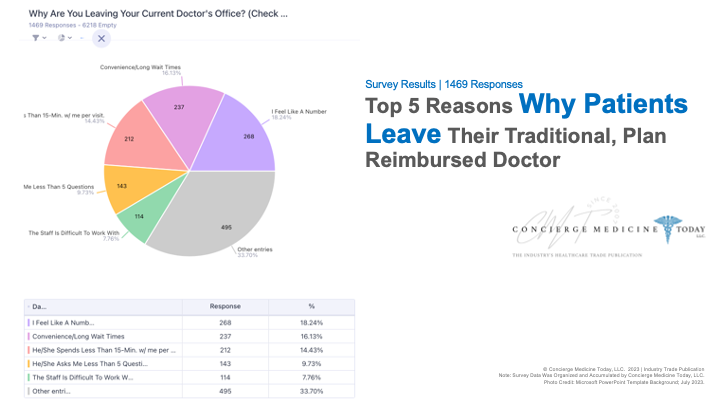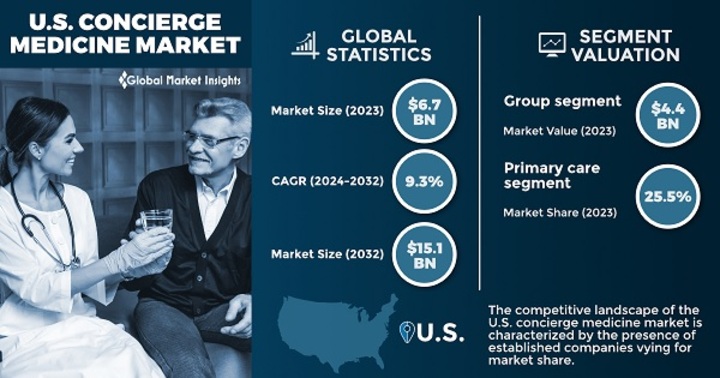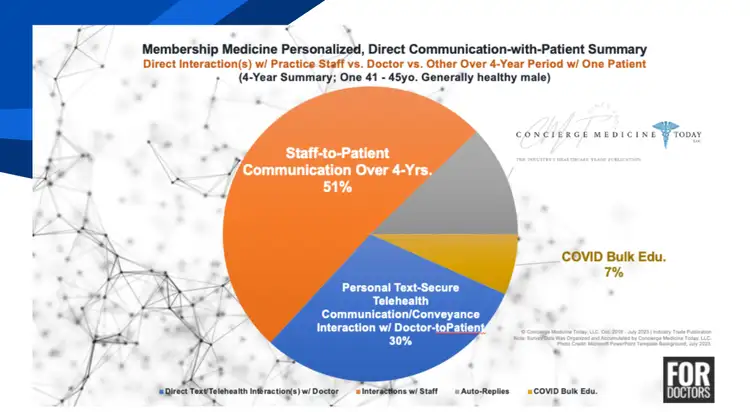The US healthcare system is a bit of a paradox: it’s advanced, innovative, and boasts some of the best medical minds in the world. Yet, for all these accolades, patients frequently report feeling like numbers on a conveyor belt, their concerns lost in the shuffle frequently resulting in misdiagnoses, medical errors, and overall poorer health outcomes. This dissatisfaction is further fueled by the ever-rising cost of healthcare, which has placed a significant weight on individuals and families.
Doctors, meanwhile, are overworked and under pressure, struggling to provide the personalized care they envision. Through all of this, it’s no wonder that the US has nosedived to 11th place in the 2022 World Index of Healthcare Innovation, a noticeable decline from 2021 where we ranked 6th and 2020 where we ranked 4th.
In this landscape, concierge medicine is gaining momentum. More and more patients are willing to pay a premium for the plethora of benefits offered by concierge medicine, such as unhurried appointments and personalized attention, while physicians are drawn to the prospect of smaller patient panels and greater autonomy. This trend suggests a growing appetite for a more personalized and relationship-driven healthcare experience.
So, is concierge medicine the future of healthcare?
In this post, we’ll examine why this model is gaining traction, address concerns and misconceptions, and look ahead to the future of concierge medicine itself.
What is the Future of Concierge Medicine?
The concept of concierge medicine isn’t new. It, in fact, first began in the mid-1990s. However, with all the medicinal and technological advancements that have arisen since then, it has heavily evolved and continues to do so, and is currently being shaped by several key trends.
Tech-Enabled House Calls
Telemedicine, remote monitoring, and AI-powered diagnostics are arguably the biggest concierge medicine trends, as they have paved the way for practices to provide an all-new level of convenient and personalized care.
As Dale Spencer, DO, from WorldClinic medical team aptly puts it, “Traditional, clinic-based medical models require the patient to get to the doctor and are often constrained by time and cost avoidance. However, the concierge healthcare model has revived the “house call” of yesteryear by bringing clinical medicine to the patient (virtually) and adding back that personal touch to the practice of medicine.“
A Higher Focus on Prevention and Wellness
The adage “an ounce of prevention is worth a pound of cure” is taking on a new modern stance. We’re seeing a growing emphasis on proactive healthcare, with concierge physicians taking the time to understand their patients’ lifestyles, genetic predispositions, and overall health goals. This allows them to create customized wellness plans, provide nutritional guidance, offer stress management techniques, etc.
The Rise of Hybrid Models
Hybrid models are emerging, allowing physicians to blend traditional practice with a limited number of concierge patients, offering a stepping stone toward a more patient-centered approach.
Collaborative Care
This model is moving away from the isolated physician model toward a more collaborative one. Many practices now include a team of healthcare professionals, such as nutritionists, mental health specialists, and physical therapists, working together to provide patients with the full scale of support they need.
Data-Driven Personalization
The use of health data and analytics will enable even more personalized and precise care recommendations. This means treatments and interventions can be fine-tuned to individual patients, optimizing outcomes.
Emphasis on Patient Advocacy
Many concierge doctors are going above and beyond and acting as advocates, helping patients navigate the complex healthcare system and ensuring they receive the best possible care.

Understanding the Growth of Concierge Medicine
Concierge medicine isn’t a fringe movement or just anecdotal; the numbers back it up, indicating that it has a hugely promising future. According to recent market research, the global concierge medicine market was valued at approximately 13.6 billion USD in 2023 and is projected to achieve a compound annual growth rate (CAGR) exceeding 6% from 2024 to 2030.
What’s Driving the Movement?
- Frustration with the Traditional Model
Long wait times, rushed appointments, and a sense of being just another number in the system are pushing patients toward alternatives. Patients crave a deeper connection with their doctors; this model delivers that in spades. - Technological Advancements
Telemedicine and remote monitoring tools are expanding the reach and accessibility, making it a viable option for more people. - Physician Burnout and the Quest for Work-Life Balance
The administrative burdens and pressures of traditional practice have led to high levels of physician burnout. Concierge medicine, with its smaller patient panels, allows doctors to reclaim their time, focus on providing quality care, and achieve a better work-life balance. - The Rise of Healthcare Consumerism
Today’s patients are more empowered and informed than ever before. They’re actively seeking healthcare solutions that align with their needs and preferences. - The Aging Population and Chronic Disease Management
As the population ages and the prevalence of chronic diseases rises, there’s a greater need for proactive and comprehensive care. This model’s emphasis on preventive measures and ongoing health management makes it an attractive option for individuals trying to manage complex health conditions.

Challenges that Threaten the Future of Concierge Medicine
The potential is undeniable, but there are some challenges within the concierge medicine model that are slowing down its uptake. However, at WorldClinic, we have come up with some strategies to tackle these head-on.
1. Membership Cost and Lack of Customizability
Most membership fees can raise eyebrows. For some, the idea of paying for healthcare beyond insurance premiums feels counterintuitive. Fees can also vary significantly, and the lack of standardized pricing structures can create confusion. Additionally, some patients may find the limited customizability of membership plans restrictive, especially if they require specialized care or have specific needs.
WorldClinic’s Commitment: Our different membership tiers offer a variety of options and customizable services, ensuring patients receive the perfect level of care, from travel risk management solutions to ongoing health management. Additionally, our services cater to both individual and group memberships. Whether it’s an individual seeking personalized care, a family looking for comprehensive coverage, or group corporate enrollments, our memberships can be adjusted accordingly.
2. Area-based Accessibility
The availability of concierge practices can vary depending on the location. In some areas, there may be a limited number of practices, making it difficult for patients to find a suitable option nearby.
WorldClinic’s Commitment: Our telemedicine solution provides patients with immediate access to care, no matter where they are, while our remote care coordination ensures that top local primary care doctors are sourced and vetted as needed. This allows patients to receive timely, effective treatment without the need for in-person visits, making healthcare more accessible and convenient.
3. Compliance and Data Security
As we’ve seen, concierge medicine and the healthcare industry at large often rely heavily on technology, particularly telemedicine. This raises concerns about data security and patient privacy. Practices need to implement stringent cybersecurity measures and adhere to regulations like HIPAA to safeguard sensitive information.
WorldClinic’s Commitment: We adhere to HIPAA regulations and utilize secure electronic medical records (EMRs) that enable efficient and protected information sharing while maintaining patient privacy.
4. The Specialist Gap
While excelling at providing comprehensive primary care patients, some practices may have limited networks or require patients to navigate the traditional doctor referral system and potentially face delays in receiving care.
WorldClinic’s Commitment: Our board-certified, multi-specialty medical team is equipped to manage complex cases, coordinate appointments, and facilitate second opinions and referrals. This approach ensures that patients receive the highest quality care, with seamless coordination across different specialties.
5. The Complex Insurance Landscape
Another big concern people have is: how does concierge medicine work with insurance? Dealing with health insurance is tricky enough as it is, but it can be even more so when it comes to adding an additional premium service like concierge care. And while some practices may accept insurance for specific services, others may require patients to pay out-of-pocket and then seek reimbursement. This added layer of confusion can deter some. Understanding whether employers offer health insurance and how that intersects with concierge medicine can further complicate matters.
WorldClinic’s Commitment: While we do not accept traditional medical insurance for membership payments, we are dedicated to working within our patients’ insurance networks when facilitating referrals and other necessary services. Our approach often prevents additional out-of-pocket expenses and can eliminate the need for unnecessary office or specialist visits.

Conclusion
Concierge medicine is steadily carving out its place in the broader healthcare system, offering a solution for those seeking a more personalized, patient-centered approach. While challenges exist, at WorldClinic, we are committed to pushing the boundaries of concierge medical services and setting a new standard for personalized, accessible, and comprehensive care.
If you’re interested in exploring this option and understanding how it fits your needs, now is the time to act. Reach out to learn more about how our services can provide the care and attention you deserve. Your health deserves nothing less.
Frequently Asked Questions
How long has concierge medicine been around?
Concierge medicine has been around since the mid-1990s. The concept gained traction as physicians sought new ways to provide more personalized and accessible care to their patients. Over the years, it has grown in popularity, with more practices adopting this model to offer enhanced care experiences.
How did the concept of concierge medicine emerge in healthcare?
The concept of concierge medicine emerged as a response to the challenges in traditional healthcare systems, where physicians often face high patient loads and limited time with everyone. By offering a membership-based model, physicians can reduce their patient panel size and focus more on personalized, preventive care. This model allows for longer appointments, more direct communication, and a stronger doctor-patient relationship.
Will patient demand impact the future of concierge medicine?
Yes, patient demand is likely to influence the future of concierge medicine. As more individuals seek personalized and accessible healthcare options, the appeal of concierge medicine grows. Patients who value close, ongoing relationships with their doctors and immediate access to care are driving this demand, potentially leading to broader adoption of the model.
Why will more doctors switch to concierge medicine in the future?
More doctors may switch to concierge medicine in the future because it offers a way to practice medicine with fewer administrative burdens and more focus on patient care. The ability to spend more time with each patient, along with reduced stress from high patient volumes, makes this model attractive to physicians who want to provide quality care while maintaining a balanced work-life dynamic. Additionally, the increasing patient demand for personalized care is likely to encourage more doctors to consider this model.


